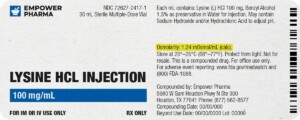After iron, zinc it the second most abundant trace element in the human body. It is a divalent cation and the 30th element as well as the first element in group 12 of the periodic table. It is an essential micronutrient that plays a key role in the catalysis of over 100 enzymes such as alkaline phosphatase, lactic dehydrogenase, and RNA and DNA polymerase. It assists in the synthesis of RNA and DNA, cell proliferation and differentiation, and the stabilization of cell membranes and cell structures. Zinc exerts its gene regulatory and expressive effects through the formation of zinc finger proteins (ZnF).
The Role of Zinc in the Human Body
Zinc also plays a role in the regulation of the immune system. Being an essential element, it is not synthesized by the human body but must be ingested through food or mineral supplements. Some of the common food sources of zinc include beef, poultry, seafood, and grains, among others. In adults, normal serum zinc levels are between 70 and 250 ug/dl. After oral ingestion, zinc absorption occurs mainly in the ileum and duodenum and its binds to plasma proteins such as albumin in the blood. Following its metabolism, it is excreted mainly in the stool; some metabolites are also excreted in the urine and sweat, but to a significantly lower extent.[1][2][3]
Administration Methods of Zinc
Zinc is usually clinically administered in the form of zinc sulfate as a supplement. The most common routes of administration of zinc sulfate are oral and parenteral. Exogenous zinc administration is typically indicated in the management of zinc deficiency.
Symptoms of Zinc Deficiency
With zinc playing a significant role in many of the body’s key processes, zinc deficiency can result in a variety of illnesses and medical disorders. Some of the clinical manifestations include, but are not limited to, the following:
Hair and weight loss.
Delayed wound healing and skin lesions such as oral lichen planus, pemphigus vulgaris, bullous pemphigoid, and epidermodysplasia verruciformis, among others.
Decreased taste sensation and loss of appetite.
Altered cognitive and motor performance in neonates and infants.
Increased susceptibility to infections due to decreased functionality in monocytes, neutrophils, granulocytes, and phagocytosis.
Exacerbation of hypertension as well as other cardiovascular diseases.
Delayed puberty and growth retardation in adolescents.
Osteoporosis as well as other abnormalities in bone mineralization and development.
Decreased folate absorption which may result in macrocytic megaloblastic anemia.
Mental lethargy and mood disorders.[4]



 Magnesium Chloride Injection
Magnesium Chloride Injection Selenium Injection
Selenium Injection Tralement Injection
Tralement Injection Calcium Gluconate Injection
Calcium Gluconate Injection